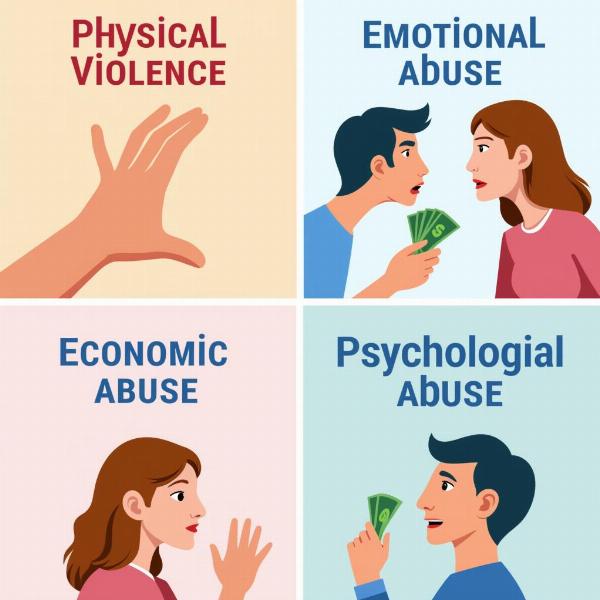Domestic abuse, a pervasive issue affecting countless families, translates to “gharelu hinsa” (घरेलू हिंसा) in Hindi. Understanding the meaning and implications of this term is crucial for recognizing, addressing, and ultimately preventing this destructive behavior within Indian communities. “Gharelu” signifies “domestic” or “household,” while “hinsa” denotes “violence” or “abuse.” Together, these words paint a stark picture of the suffering inflicted within the supposed sanctuary of the home.
Understanding the Nuances of “Gharelu Hinsa”
While the direct translation provides a basic understanding, the term “gharelu hinsa” encompasses a wide spectrum of abusive behaviors, far beyond physical violence. It includes emotional, psychological, sexual, and economic abuse, all of which can have devastating consequences for victims. This can range from verbal assaults and controlling behavior to financial manipulation and threats. The cultural context within India further complicates the issue, with deeply ingrained patriarchal norms often silencing victims and perpetuating the cycle of abuse.
 Forms of Domestic Abuse
Forms of Domestic Abuse
The Legal Framework Surrounding Domestic Abuse in India
India has taken significant strides in addressing domestic abuse through legislation like the Protection of Women from Domestic Violence Act, 2005. This act provides legal remedies for victims, including protection orders, monetary relief, and custody arrangements. However, challenges remain in ensuring effective implementation and access to justice, particularly in rural areas and marginalized communities.
Societal Stigma and the Silence Surrounding Domestic Abuse
A significant barrier to addressing domestic abuse in India is the pervasive societal stigma that often prevents victims from seeking help. Cultural norms and family pressure can lead to a culture of silence, where abuse is often minimized or dismissed as a “private matter.” This silence allows the abuse to continue and can have long-lasting psychological impacts on victims.
Breaking the Cycle: Support and Resources for Victims
Numerous organizations and resources are available to support victims of domestic abuse in India. These include helplines, shelters, legal aid services, and counseling centers. Empowering victims with information about their rights and providing them with access to support networks is crucial for breaking the cycle of abuse.
Empowering Survivors and Preventing Future Abuse
Beyond addressing the immediate needs of victims, it’s essential to focus on prevention and long-term solutions. Educating young people about healthy relationships, promoting gender equality, and challenging harmful cultural norms are critical steps in preventing future generations from experiencing domestic abuse.
What are the signs of domestic abuse?
Signs can include physical injuries, changes in behavior, isolation from friends and family, and constant fear or anxiety. Recognizing these signs can be the first step in intervening and offering support.
Where can victims of domestic abuse find help?
Several national and local helplines, shelters, and NGOs offer support, legal aid, and counseling services. Online resources also provide information and guidance.
Conclusion
Understanding “domestic abuse meaning in hindi” as “gharelu hinsa” involves recognizing its multifaceted nature and devastating impact. By acknowledging the various forms of abuse, challenging societal stigma, and empowering victims with support and resources, we can work towards creating safer homes and communities in India. Addressing this issue requires a collective effort from individuals, families, communities, and the government.
FAQ
- What is the legal definition of domestic abuse in India? The Protection of Women from Domestic Violence Act, 2005, defines domestic abuse as any act of physical, sexual, verbal, emotional, or economic abuse.
- Who can be a victim of domestic abuse? While the 2005 Act focuses on women, anyone can be a victim of domestic abuse, regardless of gender, age, or sexual orientation.
- Is it a crime to report domestic abuse? No, reporting domestic abuse is not a crime. It is a crucial step in seeking help and protection.
- What should I do if I witness domestic abuse? If safe to do so, you can offer support to the victim and encourage them to seek help. You can also report the abuse to the authorities.
- Can domestic abuse be prevented? While eradicating domestic abuse completely is a complex challenge, prevention efforts focusing on education, awareness, and changing societal attitudes can significantly reduce its occurrence.
- What are the long-term effects of domestic abuse? Victims can experience long-term physical and psychological trauma, including PTSD, anxiety, depression, and difficulty forming healthy relationships.
- Where can I find resources for domestic abuse victims in India? The National Commission for Women, several NGOs, and state-level helplines offer support and resources.
Related Articles:
mentally harassment meaning in hindi, mental cruelty meaning in hindi, traffic in human beings meaning in hindi
Meaning-Hindi.in is your trusted partner for professional Hindi translation services. We specialize in various fields, including legal, business, technical, and academic document translation. Our expert linguists ensure accurate and culturally sensitive translations to bridge communication gaps. Whether you need document translation, website localization, or interpretation services, Meaning-Hindi.in has the expertise to meet your needs. Contact us today at [email protected] or call us at +91 11-4502-7584 for a free quote.